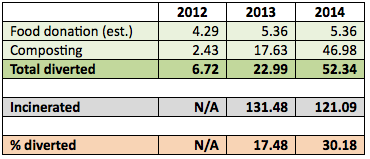Wesleyan Recognized for Efforts Diverting Food Waste

For the second consecutive year, Wesleyan recently was recognized by the U.S. Environmental Protection Agency (EPA) for its work diverting food waste. It is the only educational institution in Connecticut to receive a “Regional Food Recovery Achievement Certificate.”
Wesleyan joined the EPA’s Food Recovery Challenge in 2013. Through this program, organizations pledge to improve their sustainable food management practices and report results. Organizations are encouraged to follow the EPA’s Food Recovery Hierarchy to prioritize their actions to prevent and divert food waste. The hierarchy suggests a range of options, from reducing the volume of surplus food generated and donating extra food to hungry people to composting and landfill incineration.

“Our efforts have resulted in a dramatic increase in the amount of food waste from Usdan that is composted—from 17.63 tons in 2013 to 46.98 tons in 2014,” said Sustainability Director Jen Kleindienst. When the program began in March 2013, different bins were installed for disposing of different types of food waste. All food waste coming from meal preparation in the kitchen (called pre-consumer waste) is composted in two large Earth Tubs located near Long Lane Farm, while food waste scraped off diners’ plates (called post-consumer waste) is taken off-site to be composted, due to a lack of capacity on-site.
“It took a year for this process to be institutionalized with Bon Appétit,” Kleindienst explained. “Now we’re consistently generating 50 5-gallon buckets a week of pre-consumer waste and anywhere from 60 to 100 13-gallon buckets a week of post-consumer waste.”
The university also donates extra food to Eddy Shelter in Middletown—a little over 5 tons each of the past two years. The percent of food waste diverted—either composted of donated—rose from 17.48 in 2013 to 30.18 in 2014.
While Usdan is the only facility on campus participating in the EPA’s Food Recovery Challenge, Wesleyan composts and separately tracks food waste from Summerfields and coffee grounds from Pi Café, as well as from nearly all dorms and participating student residences.
Reducing food waste is an important component of Wesleyan’s overall sustainability efforts.
“Studies show that up to half of the food produced worldwide goes to waste, and food waste has a really big impact on carbon footprint,” said Kleindienst. “Our focus thus far has been capturing the food waste, and trying to reduce the amount we incinerate. But we still generate a lot every year year. Some of it is certainly actual waste—banana peels, chicken bones—but some of it is perfectly good food that is thrown out—a little bit of mashed potato or salad that doesn’t get eaten. And it all adds up.”
More information about Wesleyan’s other sustainability initiatives in the area of dining and food is available here. Highlights include Bon Appétit’s Farm to Fork program—a company-wide initiative requiring all cafés to purchase at least 20 percent of ingredients from small, local, owner-operated vendors and farmers within a 150-mile radius of campus—and the Real Food Campus Commitment, signed by President Michael Roth in 2012, which pledges to to buy 20 percent “real food,” defined as “local/community-based, fair, ecologically sound, and/or humane” by 2020.

